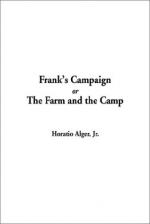On a little table, over which hung a small mirror, were several papers and magazines. Economical in most things, Mr. Frost was considered by many of his neighbors extravagant in this. He subscribed regularly for Harper’s Magazine and Weekly, a weekly agricultural paper, a daily paper, and a child’s magazine.
“I don’t see how you can afford to buy so much reading-matter,” said a neighbor, one day. “It must cost you a sight of money. As for me, I only take a weekly paper, and I think I shall have to give that up soon.”
“All my papers and magazines cost me in a year, including postage, is less than twenty dollars,” said Mr. Frost quietly. “A very slight additional economy in dress—say three dollars a year to each of us will pay that. I think my wife would rather make her bonnet wear doubly as long than give up a single one of our papers. When you think of the comparative amount of pleasure given by a paper that comes to you fifty-two times in a year, and a little extra extravagance in dress, I think you will decide in favor of the paper.”
“But when you’ve read it, you haven’t anything to show for your money.”
“And when clothes are worn out you may say the same of them. But we value both for the good they have done, and the pleasure they have afforded. I have always observed that a family where papers and magazines are taken is much more intelligent and well informed than where their bodies are clothed at the expense of their minds. Our daily paper is the heaviest item; but I like to know what is passing in the world, and, besides, I think I more than defray the expense by the knowledge I obtain of the markets. At what price did you sell your apples last year?”
“At one dollar and seventy-five cents per barrel.”
“And I sold forty barrels at two dollars per barrel. I found from my paper that there was reason to expect an increase in the price, and held on. By so doing I gained ten dollars, which more than paid the expense of my paper for the year. So even in a money way I was paid for my subscription. No, neighbor, though I have good reason to economize, I don’t care to economize in that direction. I want my children to grow up intelligent citizens. Let me advise you, instead of stopping your only paper, to subscribe for two or three more.”
“I don’t know,” was the irresolute reply. “It was pretty lucky about the apples; but it seems a good deal to pay. As for my children, they don’t get much time to read. They’ve got to earn their livin’, and that ain’t done by settin’ down and readin’.”
“I am not so sure of that,” said Mr. Frost. “Education often enables a man to make money.”
The reader may have been surprised at the ease with which Mr. Frost expressed himself in his speech at the war meeting. No other explanation is required than that he was in the habit of reading, every day, well-selected newspapers. “A man is known by the company he keeps.”




